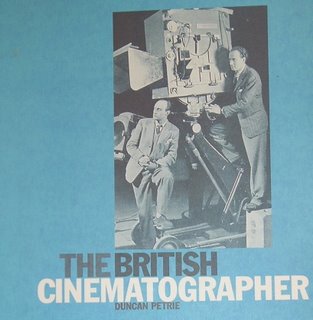7/13/2006
Book Review: THE BRITISH CINEMATOGRAPHER
 The British Cinematographer
The British Cinematographer
Duncan Petrie ~ 1996
BFI Publishing
Hardcover: $49.95
Softcover: $22.50
The British Cinematographer is an How the Other Half Lives for the film set: it provides an alternate, technical history of British cameramen, downplaying the historical and critical tendency to default onto a film's director, instead talking about the life and work of these unsung heroes of the movies. Petrie's work consists of two main parts. He begins with a narrative survey that historicizes the major technoligical developments that coincided with the conventionally known groupings/movements in British film history. This approach yields a certain, necessary re-imagining of the great names of England's cinema - the beauty of David Lean's Lawrence of Arabia (1962) is also very much because of Freddie Young's dilligence and experience, while the successful aesthetic of Derek Jarman's Edward II (1991) owes technical realization to Ian Wilson. One of the recurring stories for British cinematographers is their utter dependency of America, whether it be for stylistic precursors, technical mastery, or, starting in the mid 1970s, as a place to work. In the early days of the British studios, well after the established excellence of the Hollywood model, cinematographers had to assimilate most of their technical know-how from Americans, who were the only ones with access to sufficently excellent equipment.
Part II contains profiles of the major players. The book's greatest flaw, which is dutifully acknowledged, are its space constraints. Petrie was only able to include a relatively limited number of bios, amounting to a good smattering of the most prolific or memorable cameramen from each era. Likewise, most of the people he talks about excelled in the naturalist/realist school, but to be fair, much British film placed a particular emphasis on this presentational mode.
The British Cinematographer can be read quickly for its alternate history of British cinema, but later used as a reference guide for rectifying the general scholarly neglect toward cameramen.
 The British Cinematographer
The British CinematographerDuncan Petrie ~ 1996
BFI Publishing
Hardcover: $49.95
Softcover: $22.50
The British Cinematographer is an How the Other Half Lives for the film set: it provides an alternate, technical history of British cameramen, downplaying the historical and critical tendency to default onto a film's director, instead talking about the life and work of these unsung heroes of the movies. Petrie's work consists of two main parts. He begins with a narrative survey that historicizes the major technoligical developments that coincided with the conventionally known groupings/movements in British film history. This approach yields a certain, necessary re-imagining of the great names of England's cinema - the beauty of David Lean's Lawrence of Arabia (1962) is also very much because of Freddie Young's dilligence and experience, while the successful aesthetic of Derek Jarman's Edward II (1991) owes technical realization to Ian Wilson. One of the recurring stories for British cinematographers is their utter dependency of America, whether it be for stylistic precursors, technical mastery, or, starting in the mid 1970s, as a place to work. In the early days of the British studios, well after the established excellence of the Hollywood model, cinematographers had to assimilate most of their technical know-how from Americans, who were the only ones with access to sufficently excellent equipment.
Part II contains profiles of the major players. The book's greatest flaw, which is dutifully acknowledged, are its space constraints. Petrie was only able to include a relatively limited number of bios, amounting to a good smattering of the most prolific or memorable cameramen from each era. Likewise, most of the people he talks about excelled in the naturalist/realist school, but to be fair, much British film placed a particular emphasis on this presentational mode.
The British Cinematographer can be read quickly for its alternate history of British cinema, but later used as a reference guide for rectifying the general scholarly neglect toward cameramen.



